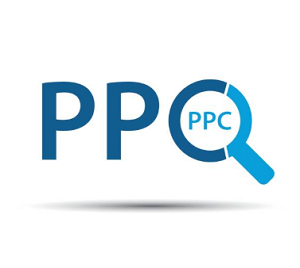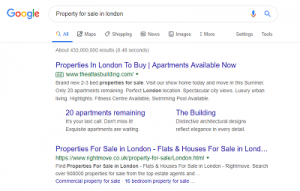
Paid Search PPC
Firstly, let’s start with the meaning of paid search (also known as pay-per-click). Paid search advertising are the adverts you see pop up at the top of the search engine results page, when placing your search into a search engines. They typically have a small ‘Ad’ icon next to them to makes them stand out.
The most popular paid search adverts are found on Google, who own the majority of the search market. These have been referred to as Google Adwords (prior to July 2018), or now simply called ‘Google Ads’.
Other search engines such as Yahoo, Bing and MSN hold 18% of the UK search market, so should not be ignored completely, however with Google holding the majority of traffic, this is where the main focus for paid advertising is mostly placed.
It is worth noting that paid search can be quite expensive, and for some businesses the budgets may not fit the model.
This is where having a very clear SEO strategy may prove more viable, and offer better returns.
Once a user clicks on your advert the money can be lost, so being found naturally in the search engines (SEO) is more beneficial as it doesn’t matter how many times someone clicks on you, you don’t pay a thing!
It has also been argued before that 80% of people searching will click on the natural results as Google has ranked the site there for a reason, they’ve built trust and credibility, and as only 20% of people click on the paid adverts, it means anyone can advertise on PPC, no matter the size or service standards of the business.
However, that being said the paid search market is booming and that’s why a digital marketing review should be undertaken before dipping your toes in as there are multiple ways to cost effectively drive traffic to your website.
So, in general with paid search whoever pays the most gets to the top. We will also discuss other factors which can influence the results later.
What is Paid Search?
As a business launches their paid search campaign, they sponsored listings would be displayed in their search results.
Every time someone clicks on their ad, the search engine would take a fee, known as cost per click (CPC), which enables the business to advertise their products and services at the top of the paid results.
There are other types of paid search which aren’t as common, called CPM (or cost per thousand), and ‘pay per call’.
CPM is based on how many impressions your advert the search engine can generate in the results (i.e. how many times someone sees the ad), and pay per call depends on how many people click on your phone number in the ad.
These types of paid search don’t depend on someone clicking through to your website, but more on how many people see the advert, or click the phone number.
There are some search engines that operate CPA (cost per acquisition), which is where their fee is taken at the point of sale, however the most widely recognised and used is CPC, cost per click (also known as PPC, pay-per-click).
Contact us today for a FREE paid search review
So what does a paid search advert look like?
Have a look at the image below. The result at the top has a small ‘Ad’ box on the left next to the website address. This shows what a paid search advert looks like. The second result down is a natural/organic result with a site that has undergone search engine optimisation.

Paid search example
Why do businesses have their paid search managed?
With the ever increasing changes in the paid search market and the rules that surround it, it’s definitely worth having an expert manage your paid listings. We are happy to do this for you.
Google for example has an editing tool that means the ads must always meet editorial guidelines. Also, a small algorithm has been introduced which means that it’s not just who pays the most gets the highest position, but make sure the advert and landing page are relevant to the search as well.
TIP: It is possible to pay slightly less, but be found higher up the ranks, simply because the advert and landing page are more relevant than a PPC competitor.
This is why having an expert who’s finger is on the pulse with Googles editorial guide lines is important.
What are the common types and acronyms for paid search advertising?
PPC
Pay per click, or PPC, is the most common paid search platform and is often used to refer to the paid search market as a whole. The advertiser simply pays Google for every click their advert attracts.
CPC
Cost Per Click. It’s similar to PPC (pay-per-click), though some businesses use Cost Per Click to refer specifically to the metric and PPC to refer to the whole campaign.
CPM
Cost Per Mille, CPM, means cost per thousand impressions. As we explained earlier this is based on impressions of how many people searching will see your advert without necessarily clicking on it.
PLA
Product Listing Ads. These are also known as Google Shopping Ads and apply to specific product sales. This advertising is very common in the e-commerce markets.
Paid search summary
If you can muster up the budget for pay-per-click, then it is the quickest way to be found at the top of the search engine results, and if you know how to use the paid search platform, then it doesn’t take long to get your account up and running.
You may also find you get a free voucher incentive when you spend over a certain amount to help get you started. Being able to measure the results is pretty good too, as the platforms will show exactly the journey of the customer and the amount of clicks for certain keywords you have obtained over any given period. This makes testing different types of adverts fun and measurable.
Are you looking for your paid search campaign to be managed by the experts?
Call us today on 01702 742 077, or contact us here.


